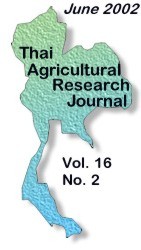ThaiScience
ThaiScience
THAI AGRICULTURAL RESEARCH JOURNAL
Volume 38, No. 03, Month SEPTEMBER, Year 2020, Pages -
K2 a newly isolated strain of bacillus amyloliquefaciens regulates responsive proteins for its survival and promotes plant growth of rice seedlings against bacterial leaf blight and salt stresses
Sasiprapha Marach, Tiyakhon Chatnaparat, Supot Kasem, Sutruedee Prathuangwong
Abstract Download PDF
Soil salinity limits the growth and productivity of crop plants worldwide including Thailand. Plant growth promoting rhizobacteria (PGPR) can elicit plant tolerance against both biotic and abiotic (adverse-environmental effects) stresses that may become an alternative process in crop management system. In this study, a new PGPR strain is hypothesized whether it can adapt to high salt concentrations and promote seedling growth of rice against Xanthomonas oryzae pv. oryzae (Xoo), causal organism of bacterial leaf blight, under salt stress that might correlate with its biosynthesis of stress-responsive proteins production. Forty eight bacteria were isolated from different salt -soil lands, and strain K2 (obtained from mangrove plant rhizosphere at Bangkrachao, Samut Prakan) was selected for further investigation based on its superior in biocontrol activity and survival in nutrient broth (NB) plus 12% NaCl which indicated that K2 was a halophilic bacterium. Strain K2 was identified using physiological and biochemical properties, 16s rRNA and gyrB nucleotide sequencing analysis revealed that K2 was placed in Bacillus amyloliquefaciens. Culture filtrates of strain K2 grown in NB with or without 5%NaCl for 24 h were subjected to proteomic analysis. Strain K2 and its culture filtrates exhibited a good performance in Xoo suppression shown by plate assay, and increased growth enhancement of rice seedlings (root length and shoot height) under both normal and salt-stress conditions. Of the shotgun proteomic LC-MS/MS identified proteins, the specific proteins were up-regulated in K2 – salinity grown cells. A key role for proteins predominantly expressed in above analysis was likely mediating plant health tolerated to Xoo and salt stresses. Those involving proteins included the iron scavenging and transport, defense mechanism, the synthesis and transport of compatible solutes, protein expression in protecting K2 survival and adaptation, biocontrol activity, plant growth promotion, and induced salt tolerance was discussed.
Keywords
Halophilic bacteria, Phylogenetic analysis, Xanthomonas oryzae pv. oryzae, High-throughput proteome analysisTHAI AGRICULTURAL RESEARCH JOURNAL
Published by : Department of Agriculture
Contributions welcome at : http://it.doa.go.th/
